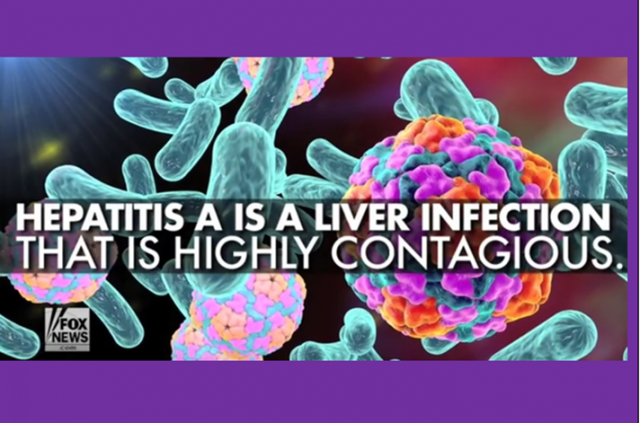Hepatitis A Cases Surge Across the Nation
South Carolina declares statewide outbreak as Florida is reporting that the liver disease is rapidly spreading through the state.

Hepatitis A, a virus capable of affecting the liver and causing death, has made a resurgence among adults in the U.S.
According to a recent report by the Centers for Disease Control and Prevention (CDC), Hepatitis A infections have soared nearly 300% in the past few years.
The staggering increase has come despite an effective vaccine and is seen mostly among drug abusers and the homeless, according to the U.S. Centers for Disease Control and Prevention.
Hepatitis A virus can linger in feces and be spread hand-to-hand, with infection occurring when a hand contaminated by the virus touches the person’s mouth.
“In the previous decade, large outbreaks of hepatitis A were rare and mostly attributed to contaminated commercial food products,” noted lead researcher Dr. Monique Foster, an epidemiologist in CDC’s Division of Viral Hepatitis.
Public health professionals have grown concerned that the anti-vaccination movement has contributed to the rapidly escalating numbers.
The CDC recently reported that since 2016, there have been 8,500 hospitalizations and at least 140 deaths nationwide more than would be expected with hepatitis A.
“The risk of disease occurs when vaccines are foregone,” Dr. Anne Schuchat, principal deputy director of the CDC, said last week. “Hepatitis A vaccinations have been routine for young children for some years, and the outbreak occurs primarily in adults.”
In the past, hepatitis A outbreaks happened every 10 to 15 years in children who showed no symptoms of the illness. Children are now routinely vaccinated at age 1.
But a large number of adults who did not receive the vaccine or have the infection as children, remain vulnerable to the virus from contaminated food and on a larger scale through behaviors like drug use, the new report explains.
South Carolina declared a statewide outbreak of Hepatitis A after officials logged a 4-fold increase in the number of cases.
“We have met the definition of an outbreak in South Carolina based on an increase in the number of cases we’d expect to see in a given time frame,” Dr. Linda Bell, state epidemiologist at the South Carolina Department of Health and Environmental Protection, told The Greenville News.
“This also allows us to take some pro-active measures to prevent the ongoing spread.”
The state typically sees about 19 cases of hepatitis A a year, but has recorded more than four times that number in the past seven months, Bell said.
Of those 86 cases between November 2018 and May 2019, 59 were hospitalized and one died.
The disease has started spreading through Florida.
Despite giving out more than 6,900 free hepatitis A vaccines last week, Florida saw its biggest weekly increase in new cases of the contagious liver disease.
The Florida Department of Health reported an additional 92 hepatitis A cases during the week ending May 11, bringing the total since the beginning of the year to 1,129 people. The 92 new cases — four of them in South Florida — represent the most reported in one week since the hepatitis A outbreak started in 2018.
Legal Insurrection readers may recall that the Hepatitis A outbreak in 2017 in San Diego. Currently, a bill is going through California’s State’s Assembly that would make local governments more proactive during outbreaks of communicable diseases, such as public health officials guiding those governments in vaccination programs or providing data related to where clusters of infections occur.
The December 2018 report by state Auditor Elaine Howle found that San Diego County health officials failed to vaccinate at-risk residents quick enough or consider the level of resources like nurses necessary to protect residents from the outbreak. While health officials confirmed an average of 20 new hepatitis A cases each week from May to mid-September 2017, vaccinations only began to spike in September.
The county was also sluggish to communicate information about hepatitis A cases with the city of San Diego, waiting to share outbreak data until eight months after the first case of the infection was confirmed. As a result, both the city and county failed to increase access to sanitizing resources like hand-sanitizing stations and public restrooms until months after cases were first reported.
Donations tax deductible
to the full extent allowed by law.








Comments
The photo of Rashida Tliab and Sarsour that came up below the picture of the Hep virus was apt.
Blaming anti vac people
Not the homeless or drug users, who we all know hold getting vaccines near and dear to their heart, I mean it’s right up there with the right to defecate…
Both are responsible. Being an adult is about picking lesser evils. It is also about considering collective good.
Clearly, homeless druggies consider neither.
Got the Hep A vaccine years ago when we moved to the third world. Never thought it would come in handy when visiting San Francisco.
Reminds me of the old Soviet joke – What did socialists use before candles? Electricity.
The amount of anti vac is minuscule
I wonder if the hordes of illegals invading our country have anything to do with this.
Addiction is a symptom of PTSD. Look it up.
Rational drug policies would reduce the side effects of our current policy.
About 20 American AGs (IIRC) recently visited Portugal to look into their drug policies.